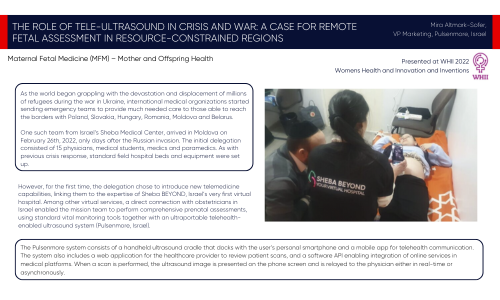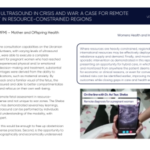Author:
Mira Altmark -Sofer
As the world began grappling with the devastation and displacement of millions of refugees during the war in Ukraine, international medical organizations started sending emergency teams to provide much needed care to those able to reach the borders with Poland, Slovakia, Hungary, Romania, Moldova and Belarus.
One such team from Israel’s Sheba Medical Center, arrived in Moldova on February 26th, 2022, only days after the Russian invasion. The initial delegation
consisted of 15 physicians, medical students, medics and paramedics. As with previous crisis response, standard field hospital beds and equipment were set up
However, for the first time, the delegation chose to introduce new telemedicine capabilities, linking them to the expertise of Sheba BEYOND, Israel’s very first virtual hospital. Among other virtual services, a direct connection with obstetricians in Israel enabled the mission team to perform comprehensive prenatal assessments, using standard vital monitoring tools together with an ultraportable telehealthenabled ultrasound system (Pulsenmore, Israel).
The Pulsenmore system consists of a handheld ultrasound cradle that docks with the user’s personal smartphone and a mobile app for telehealth communication. The system also includes a web application for the healthcare provider to review patient scans, and a software API enabling integration of online services in medical platforms. When a scan is performed, the ultrasound image is presented on the phone screen and is relayed to the physician either in real-time or asynchronously.

Utilizing this platform’s online consultation capabilities on the Ukrainian border, Sheba’s mission volunteers, with varying levels of ultrasound education and experience, were able to execute a complete sonographic fetal assessment for pregnant women who had reached the medical camp having experienced physical and/or emotional trauma. Further to clinical decision-making and treatment, substantial value and significant advantages were derived from the ability to eliminate semi-medical indications, such as maternal anxiety. By providing immediate feedback and a familiar visual of the fetus, the pregnant women were reassured and able to better compartmentalize the traumatic experience and refocus on their own well-being. The opportunity for using remote fetal assessment in resourceconstrained regions is immense and not unique to war zones. The Sheba Medical Center experience has demonstrated several key learnings, one being that prenatal ultrasound can be performed by individuals with limited experience and understanding of the modality, with focused guidance of an expert.
In many parts of the world, this would be enough to free up obstetrician time and enable top-of-license practices. Second, is the opportunity to enhance accessibility in geographically and economically underserved areas.

Where resources are heavily constrained, regional, national and international resources may be effectively deployed to balance and rebalance supply and demand. Finally, and moving beyond the case of sporadic intervention as demonstrated in this report, the technology is presenting an opportunity for hybrid care, in which pregnancy is managed and monitored from anywhere the patient deems appropriate – whether for economic or clinical reasons, or even for convenience; and pregnancyrelated risks can be identified earlier, improving maternal and fetal outcomes while closing gaps in care and health equity


Presented at: FMF Mother and offspring health WHII womens health and innovation and inventions, Israel 2022

